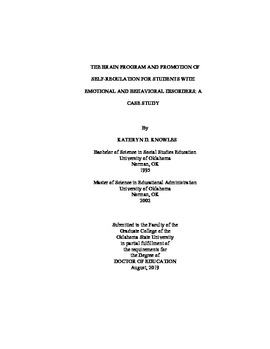| dc.contributor.advisor | Harris, Ed | |
| dc.contributor.author | Knowles, Kathryn D. | |
| dc.date.accessioned | 2020-01-30T15:03:07Z | |
| dc.date.available | 2020-01-30T15:03:07Z | |
| dc.date.issued | 2019-08 | |
| dc.identifier.uri | https://hdl.handle.net/11244/323352 | |
| dc.description.abstract | The purpose of this qualitative case study is to explore, through the lens of self-regulated learning theory, the interrelationship of the BRAIN program and the development of positive classroom behaviors for students with emotional and behavioral disorders in a selected Midwestern school district. This study used purposeful sampling to select five school sites implementing the BRAIN program. The study participants were principals and BRAIN teachers at the five school sites. Data were collected through interviews of four principals, five BRAIN teachers, observations, and documents. Identification of self-regulated learning theory espoused by Zimmerman and Campillo (2003), Zimmerman (2000), and Pintrich and Zusho (2002) occurred prior to conducting the study, providing a lens through which to present and analyze the implementation of the BRAIN program at the five school sites. Findings indicated the BRAIN program is a district-led program implemented with consistency at five school sites for grade levels K-8. The BRAIN team at each site has autonomy in flexing the program to meet the needs of students with support from the district BRAIN team. Self-regulated learning theory helps to explain the interrelationship of the BRAIN program and the facilitation of the development of positive classroom behaviors. Through the cycle of forethought, performance or practice, and self-reflection, students learn to self-regulate behaviors and gain control in the general education classrooms. As this cycle continues, students become more confident in their abilities and are intrinsically motivated toward greater autonomy in controlling the behaviors. Additional research could focus on BRAIN students as they progress and exit the program to better understand their perceptions on their ability to self-regulate behaviors. | |
| dc.format | application/pdf | |
| dc.language | en_US | |
| dc.rights | Copyright is held by the author who has granted the Oklahoma State University Library the non-exclusive right to share this material in its institutional repository. Contact Digital Library Services at lib-dls@okstate.edu or 405-744-9161 for the permission policy on the use, reproduction or distribution of this material. | |
| dc.title | BRAIN Program and Promotion of Self-Regulation for Students with Emotional and Behavioral Disorders: A Case Study | |
| dc.contributor.committeeMember | Mania Singer, Jackie | |
| dc.contributor.committeeMember | Richardson, Shawna | |
| dc.contributor.committeeMember | Hammer, Tonya R. | |
| osu.filename | Knowles_okstate_0664D_16327.pdf | |
| osu.accesstype | Open Access | |
| dc.type.genre | Dissertation | |
| dc.type.material | Text | |
| dc.subject.keywords | self-regulated learning theory | |
| dc.subject.keywords | self-regulation | |
| thesis.degree.discipline | School Administration | |
| thesis.degree.grantor | Oklahoma State University | |
